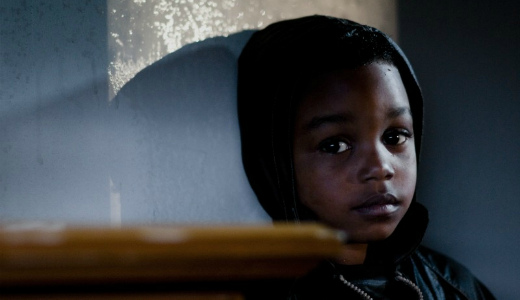
One of the more prominent themes at this year’s Toronto International Film Festival was immigration. With the world facing increased poverty as the rich get richer, filmmakers are examining the ramifications of shifting populations. The richer countries are facing the realities that the poor of the earth have to find new lands to survive.
Two great new films from Italy address the moral and human aspects of the growing phenomenon of so-called “illegal” immigration. Cardboard Village, directed by the veteran master Ermanno Olmi (Tree of Wooden Clogs), tells about a group of North African refugees who take shelter in a Catholic church that’s set for demolition. The lonely aging priest, played by famed actor Michael Lonsdale (Munich, Of Gods And Men and Free Men, which also appears at this year’s TIFF), confronted with this final challenge in his decaying parish, takes the moral high ground and defends their right to seek shelter against the impending threat of starvation and possible death. In defiance, a tent city is constructed inside the empty church, while the priest, who could face charges of harboring illegals, contemplates the ethical questions that define the role of the church and just being human. The police eventually arrive and the movie offers a poignant resolution to the crisis. Possibly the last film from this revered director.
With a different locale, but the same issue of immigration, Terraferma takes us to a sunny island off the coast of Sicily, where an old fisherman takes his grandson out to sea to learn the fishing trade. As the sun begins to set, they see a starling vision in the horizon: a raft overloaded with human beings frantically waving for help. As several take the risk and jump off the raft desperately heading towards their boat, the old fisherman chooses between the new law of the land that punishes those who pick up “illegals,” versus the law of the sea, which directs a person with moral conscience to pull drowning people from the water. A pregnant mother and several others are loaded onboard before a Coast Guard boat arrives and they leave before getting caught. The story takes us through an emotional roller coaster. A pregnant woman and her son are taken in while the others flee once they reach land. The fisherman’s daughter helps deliver the baby that we soon find out was the result of a prison rape in Libya. The hardships of their long journey from Ethiopa, the reluctance of the daughter to accept the Africans, the villagers who pride their island as a resort town free of “illegals” and the eventual concerns about how they will get off the island with increasing police surveillance, infuses this drama with one moral (and political) dilemma after another. Director Emanuele Crialese, appearing after the screening, revealed that the woman playing the African mother actually was an immigrant from Somalia who encountered the tragedies depicted in the movie.
Acclaimed Finnish director, Aki Kaurismäki (Match Factory Girl, Man Without A Past), has also turned to the hot button issue of immigration. Applying his trademark style of dry humor, simple camera movement and a warmth for the working class, he offers a story about a man faced with the moral dilemma of harboring an “illegal.” Le Havre won the FIPRESCI Award at the 2011 Cannes Film Festival, and this “fairy tale” comical approach to a serious social issue is as effective as a hard-hitting documentary. An old shoeshine man (played by renowned French actor, Jean-Pierre Darroussin, who starred as the shop foreman in Snows of Kilimanjaro) hides a young African boy in his tiny house under the watchful eyes of his neighbors. Without any need to justify his actions, he eventually gains support from others to help the boy get to the rest of his family in London. Human kindness and the moral decision to save a human life, as depicted so often in history and movies like Anne Frank’s Diary, The Visitor and El Norte, just to name a few, are often emphasized in Kaurismäki’s enriching and entertaining works.
France produced one of the greatest film couples in history, directors Agnes Varda (Vagabond, One Sing, The Other Doesn’t) and Jacques Demy (Umbrellas of Cherbourg, Donkey Skin). And they in turn produced an equally talented son, actor Mathieu Demy, who in turn produced, wrote, directed and acted in his first feature film, Americanos, which also happens to address the issue of immigration. A well-crafted and acted film, featuring Charles Chaplin’s daughter, Geraldine, Marcella Mastroianni’s daughter, Chiara, and the amazing Mexican actress Salma Hayek, the story follows a young man who travels from Paris to Los Angeles to close out the house and belongings of his recently deceased mother. He had long ago lost favor with his mother when his parents divorced and he moved to France with his father. While trashing any memories of his mother into the garbage can, he learns from a neighbor that she had a young Mexican woman living with her, and had willed the house to her. Surprised by the revelation, his search for her takes him to the gritty side of Tijuana to find the legal owner of his mother’s house. What he discovers on his journey is the harrowing story of a young woman deported from America, forced to live in prostitution to survive with a young son she tries in vain to raise. This absorbing film flows like real life, carried on by actors at their best and a director who shows great promise.
Here are four new films, created by talented directors, all appearing at just one film festival, all dealing with the growing crisis of people immigrating under the harshest conditions, just in order to survive.
Photo: Still from Cardboard Village.












Comments